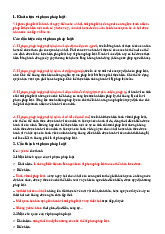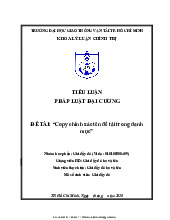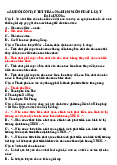










Preview text:
THE NATIONAL
SOCIALIST REPUBLIC OF VIETNAM ASSEMBLY
Independence - Freedom - Happiness -------- --------------- The Law No. 91/2015/QH13
Hanoi, November 24, 2015 CIVIL CODE
Pursuant to the Constitution of the Socialist Republic of Vietnam;
The National Assembly promulgates a Civil Code. ……….. Chapter III NATURAL PERSONS
Section 1. LEGAL PERSONALITY AND LEGAL CAPACITY OF NATURAL PERSONS
Article 16. Legal personality of natural persons
1. The legal personality of a natural person is his/her capability to have civil rights and civil obligations.
2. All individuals shall have the same legal personality.
3. The legal personality of a natural person commences at birth and terminates at death.
Article 17. Contents of the legal personality of a natural person
1. Personal rights not associated with property, and personal rights associated with property.
2. Ownership rights, inheritance rights and other rights with respect to property.
3. Rights to participate in civil relations and to assume obligations arising out of such relations.
Article 18. No restrictions on the legal personality of natural persons
The legal personality of a natural person shall not be restricted, unless otherwise provided for by law.
Article 19. Legal capacity of natural persons
The legal capacity of a natural person is his/her capability to establish and exercise civil rights
and perform civil obligations through his/her acts. Article 20. Adults
1. Adults are persons who are eighteen years of age or older.
2. Each adult shall have full legal capacity, except for the cases prescribed in Articles 22, 23 and 24 of this Code. Article 21. Minors
1. Minors are persons who are under eighteen years of age.
2. Civil transactions of each child under six years of age shall be established and performed by his/her legal representative.
3. Each person who is from six to under eighteen years of age must have the consent of his/her
legal representative to enter in and perform civil transactions, except for civil transactions which
are performed for the purpose of meeting the needs of daily life suitable for the age group.
4. Each person who is from fifteen to under eighteen years of age is entitled to enter in and
perform civil transactions by himself/herself, except for civil transactions related to real estate,
movables required registration and other civil transactions as prescribed by law that are subject
to the consent of his/her legal representative.
Article 22. Lack of legal capacity
1. A court shall, based on the opinion of forensic-psychiatric examination by any authorized
organization and at the request of a person with related rights or interests or a relevant agency or
organization, issue a decision to declare a legally incapacitated person who as a result of his/her
mental or other illnesses cannot realize or conduct his/her actions.
Where the basis on which a person has been declared incapacitated no longer exists, the court
shall, at the request of such person or any person with related rights or interests, issue a decision
to revoke the decision declaring the incapacitated person.
2. All civil transactions of a legally incapacitated person shall be established and performed by his/her legal representative.
Article 23. Persons with limited cognition or behavior control
1. A court shall, based on the opinion of forensic-psychiatric examination by any authorized
organization and at the request of a person with related rights or interests or a relevant agency or
organization, issue a decision to declare an adult with limited cognition or behavior control due
to his/her physical or spiritual condition, and appoint a legal guardian and define rights and obligations of such guardian.
2. Where the basis on which a person has been declared limited cognition or behavior control no
longer exists, the court shall, at the request of such person or any person with related rights or
interests, issue a decision to revoke the decision declaring the person with limited cognition or behavior control.
Article 24. Persons with limited legal capacity
1. A court shall, at the request of a person with related rights or interests or a relevant agency or
organization, issue a decision to declare a person with limited legal capacity after excessive drug
consumption or other psychotropic substances, worsening material situation of the family.
The court shall appoint a legal representative of the person with limited legal capacity and the representation scope.
2. All civil transactions related to the property of a person with limited legal capacity declared by
a court must obtain the consent of his/her legal representative, except for transactions to meet the needs of daily life.
3. Where the basis on which a person has been declared limited capacity of exercise no longer
exists, the court shall, at the request of such person or any person with related rights or interests,
issue a decision to revoke the decision declaring the incapacitated person. ………………… Chapter VII PROPERTY Article 105. Property
1. Property comprises objects, money, valuable papers and property rights.
2. Property includes immovable property and movable property. Immovable property and
movable property may be existing property or off-plan property. …………. PART TWO
OWNERSHIP RIGHTS AND OTHER PROPERTY-RELATED RIGHTS Chapter XI GENERAL PROVISIONS
Section 1. Rules for establishing and exercising ownership rights and other property- related rights
Article 158. Ownership rights
Ownership rights comprise the rights of an owner to possess, use and dispose of the property of
the owner in accordance with law.
Article 159. Other property-related rights
1. Other property-related rights mean rights of entities directly hold or control the property
belonging to ownership rights of another entity.
2. Other property-related rights include:
a) Right to adjacent immovable property; b) Usufruct right; c) Surface rights. PART FOUR INHERITANCE Chapter XXI GENERAL PROVISIONS
Article 609. Rights of inheritance
A natural person may make a will to dispose of his or her estate, may leave his or her property to
an heir in accordance with law, or may inherit an estate left to him or her under a will or in accordance with law.
An heir not being natural person has the right to inherit estate under a will.
Article 610. Equality of individuals with respect to rights of inheritance
All natural persons are equal with respect to rights to bequeath their property to others and to
inherit estates under wills or in accordance with law.
Article 611. Time and place of commencing inheritance
1. The time of commencement of an inheritance shall be the time when the deceased dies. Where
a court declares that a person is dead, the time of commencement of the inheritance shall be the
date provided in Clause 2 of Article 81 of this Code.
2. The place of commencement of the inheritance shall be the last place of residence of the
owner of the estate. If the last place of residence is not able to be determined, the place of
commencement of the inheritance shall be the place at which all or most of the estate is located. Article 612. Estates
An estate comprises property which the deceased owned and property which the deceased jointly owned with other persons. Article 613. Heirs
If an heir is an individual, such person must be alive at the time of commencement of the
inheritance or, if such person is born and alive after the commencement of inheritance, must have
been conceived prior to the time when the deceased dies. Where an heir under a will is a body or
organization, it must be in existence at the time of commencement of the inheritance.
Article 614. Time when rights and obligations of heirs arise
From the time of commencement of an inheritance, the heirs have the property rights and
obligations left by the deceased.
Article 615. Performance of property obligations left by deceased
1. A person entitled to an inheritance has the responsibility to perform the property obligations
within the scope of the estate left by the deceased, unless otherwise agreed.
2. Where an estate has not yet been divided, the property obligations left by the deceased shall be
performed by the administrator of the estate as agreed by the heirs.
3. Where an estate has already been divided, each heir shall perform those property obligations
left by the deceased corresponding to, but not exceeding, that part of the estate that the heir has
inherited, unless otherwise agreed.
4. Where the heir inheriting an estate under a will is not a natural person, it must perform the
property obligations left by the deceased in like manner as a natural person. ……….
Article 619. Inheritance by persons entitled to inherit each other's estate but dead at same time
Where persons who are entitled to inherit each other's estate die at the same time or are deemed
to have died at the same time because it is impossible to determine who of them died first
(hereinafter referred to as simultaneous death), they do not have the right to inherit each other's
estate and the estate of each of the deceased shall be inherited by their respective heirs, except in
the case of inheritance pursuant to Article 652 of this Code.
Article 620. Disclaimer of inheritance
1. An heir may disclaim an inheritance, unless such disclaimer is for the purpose of avoiding the
performance of its property obligations to other persons.
2. A disclaimer of an inheritance must be made in writing. A person disclaiming must notify the
other heirs and the person authorized to distribute the estate.
3. The disclaimer of an estate must be expressed before the time of inherit distribution.
Article 621. Persons not entitled to inherit
1. The following persons are not entitled to inherit:
a) Persons convicted of having intentionally caused the death of or harmed the health of the
deceased, of having seriously mistreated or tortured the deceased, or of having harmed the honor or dignity of the deceased;
b) Persons having seriously breached their duty to support the deceased;
c) Persons convicted of having intentionally caused the death of another heir in order to obtain
all or part of the entitlement of such other heir to the estate;
d) Persons deceiving, coercing or obstructing the deceased with respect to the making of the will,
or forging, altering or destroying the will in order to obtain all or part of the estate contrary to the wishes of the deceased.
2. Persons provided in Clause 1 of this Article may, nevertheless, inherit the estate if the
deceased was aware of such acts but, nevertheless, allowed them to inherit the estate under the will.
Article 622. Estates which no one inherits
Where there is no heir under a will and at law, or where there is an heir but such heir is not
entitled to inherit the estate or disclaims the inheritance of the estate, the residual estate for
which there is no heir shall, after fulfillment of property obligations, belong to the State.
Article 623. Prescriptive periods with respect to inheritance
1. The prescriptive period with respect to a claim of an heir for distribution of an estate shall be
thirty years regarding immovable property or ten years regarding movable property from the
time of commencement of the inheritance. Upon the expiry date of the aforesaid period, the
estate shall belong to the estate administrator. In case where there is no estate administrator, the
estate shall be dealt with as follows:
a) It shall belong to the person possessing it as prescribed in Article 236 of this Code;
b) It shall belong the State if there is no possessor prescribed in Point a of this Clause.
2. The prescriptive period with respect to a claim of an heir for a declaration of right of
inheritance of the requester or to disallow the claim to inheritance of another shall be ten years
from the time of commencement of the inheritance.
3. The prescriptive period with respect to a claim for an heir to fulfill property obligations of the
deceased shall be three years from the time of commencement of the inheritance. Chapter XXII INHERITANCE UNDER WILLS Article 624. Wills
Will means an expression of the wishes of a natural person, made in order to bequeath his or her
property to others after his or her death. Article 625. Testators
1. An adult satisfying conditions prescribed in Point a Clause 2 Article 630 of this Code may
make a will to dispose his/her property.
2. A person who is between fifteen and eighteen years of age may make a will with the consent
of his or her parents or guardian.
Article 626. Rights of testators
A testator has the following rights:
1. Appoint heirs or to deprive an heir of the right to inherit the estate;
2. Determine those parts of the estate which each heir is entitled to;
3. Reserve part of the estate as a gift or for worship purposes;
4. Designate heirs to perform obligations;
5. Appoint a custodian of the will, an administrator of the estate, and a distributor of the estate.
Article 627. Formalities for wills
A will must be made in writing. If it is not able to be made in writing, it may be made orally. …………..
Article 643. Legal effectiveness of wills
1. A will shall become legally effective from the time of commencement of the inheritance.
2. All or part of a will shall be legally ineffective in any of the following cases:
a) An heir under the will dies prior to or at the same time as the testator dying;
b) A body or organization named as an heir no longer exists at the time of commencement of the inheritance.
Where there are several heirs under a will and one of them dies prior to or at the same time as the
death of the testator or one of the bodies or organizations named as an heir under the will no
longer exists at the time of commencement of the inheritance, only that part of the will which
relates to the individual, body or organization no longer existing shall be legally ineffective.
3. A will shall not be legally effective if the estate left to the heirs no longer exists at the time of
commencement of the inheritance. If only part of the estate left to the heirs remains, only that
part of the will which relates to such part of the estate shall be legally effective.
4. Where a will contains provisions which are unlawful but such provisions do not affect the
effectiveness of the remainder of the will, only such provisions shall be legally ineffective.
5. Where a person leaves behind more than one will with respect to certain property, only the
most recent of such wills shall be legally effective.
Article 644. Heirs notwithstanding contents of wills
1. Where a testator does not grant any of the following persons an inheritance, or grants any such
person an inheritance which is less than two-thirds of the share that person would have received
if the estate had been distributed according to law, such person shall be entitled to a share of the
estate equivalent to two-thirds of the share that he or she would have received if the estate had
been distributed in accordance with law:
a) Children who are minors, father, mother, wife or husband of the testator;
b) Children who are adults but who are incapable of working.
2. Clause 1 of this Article shall not apply to persons who have disclaimed their inheritance as
prescribed in Article 620 or person who are not entitled to inherit as prescribed in Clause 1 Article 621 of this Code. ………… Chapter XXIII INHERITANCE AT LAW
Article 649. Inheritance at law
Inheritance at law means inheritance in accordance with the order of priority of inheritance and
the conditions and procedures of inheritance provided by law.
Article 650. Cases of inheritance at law
1. Inheritance at law shall apply in the following cases: a) There is no will; b) The will is unlawful;
c) All heirs under the will died prior to or at the same time as the testator dying, or the bodies or
organizations which are entitled to inherit under the will no longer exist at the time of
commencement of the inheritance;
d) The persons appointed as heirs under the will do not have the right to inherit or disclaimed the right to inherit.
2. Inheritance at law shall also apply to the following parts of an estate:
a) Parts of an estate in respect of which no disposition has been made in the will;
b) Parts of an estate related to an ineffective part of the will;
c) Parts of an estate related to heirs under the will not having the right to inherit, having
disclaimed the right to inherit, or having died prior to or at the same time as the testator dying;
and parts of an estate related to bodies or organizations entitled to inherit under the will but no
longer existing at the time of commencement of the inheritance.
Article 651. Heirs at law
1. Heirs at law are categorized in the following order of priority:
a) The first level of heirs comprises: spouses, biological parents, adoptive parents, offspring and
adopted children of the deceased;
b) The second level of heirs comprises: grandparents and siblings of the deceased; and biological grandchildren of the deceased;
c) The third level of heirs comprises: biological great-grandparents of the deceased, biological
uncles and aunts of the deceased and biological nephews and nieces of the deceased.
2. Heirs at the same level shall be entitled to equal shares of the estate.
3. Heirs at a lower level shall be entitled to inherit where there are no heirs at a higher level
because such heirs have died, or because they are not entitled to inherit, have been deprived of
the right to inherit or have disclaimed the right to inherit.
Article 652. Succeeding heirs
Where a child of a testator died prior to or at the same time as the testator, the grandchildren of
the testator shall inherit that part of the estate which their father or mother would have been
entitled to inherit had such father or mother still been alive. If the grandchildren also died prior to
or at the same time as the testator, the great-grandchildren of the testator shall inherit that part of
the estate which their father or mother would have been entitled to inherit had such father or mother still been alive.
Article 653. Inheritance relations between adopted children and their adoptive parents and biological parents
An adopted child and his or her adoptive parents may inherit each other's estates and may also
inherit in accordance with articles 651 and 652 of this Code.
Article 654. Inheritance relations between stepchildren and their stepparents
If a stepchild and his or her stepparents care for and support each other as though they were
biologically related, they may inherit each other's estates and may also inherit in accordance with
articles 652 and 653 of this Code.
Article 655. Inheritance where wives and husbands have divided multiple ownership
property, have applied for divorce or have remarried
1. Where a wife and husband have divided their multiple ownership property while they are still
married and one of them subsequently dies, the surviving spouse shall still be entitled to inherit the estate of the deceased.
2. Where a wife and husband have applied for but not yet obtained a legally effective divorce
pursuant to a judgment or decision of a court, or they have obtained such a divorce but the
judgment or decision of the court is not yet effective, and one of them dies, the surviving spouse
shall, nevertheless, be entitled to inherit the estate of the deceased.
3. A person who is the wife or husband of the deceased at the time when his or her spouse dies
shall be entitled to inherit the estate of the deceased even if that person subsequently remarries. Chapter XXIV
SETTLEMENT AND DISTRIBUTION OF ESTATES ………….
Article 658. Order of priority of payment
Property obligations and expenses related to an inheritance shall be paid in the following order of priority:
1. Reasonable funeral expenses in accordance with customary practice;
2. Outstanding support payments;
3. Expenditures on preservation of estate;
4. Allowances for dependants of the deceased; 5. Wages;
6. Monetary compensation for any damage;
7. Taxes and other liabilities owed to the State;
8. Other liabilities owed to other natural persons or juridical persons; 9. Fines; 10. Other expenses. …………………….




